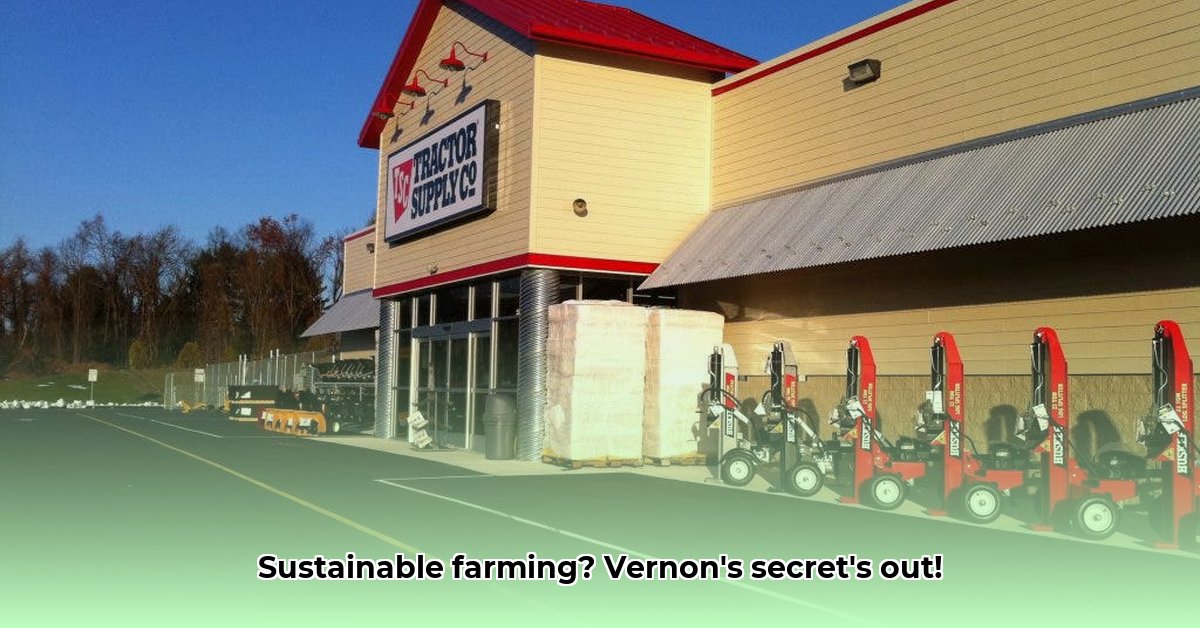
Tractor Supply Company (TSC), with locations in Vernon, Texas, and Vernon, Connecticut, significantly impacts the agricultural landscape. This article analyzes TSC's contribution to sustainable agriculture in Vernon, evaluating its current practices and proposing actionable recommendations for improvement. We examine TSC's product range, sustainability efforts, stakeholder perspectives, and potential pathways toward a greener future within the agricultural sector. For more information on TSC locations, visit this page.
Tractor Supply's Vernon Footprint: Accessibility and Sustainability
TSC's Vernon stores offer a broad range of agricultural products, from seeds and fertilizers to tools and animal feed, catering to both large-scale commercial farmers and home gardeners. The accessibility of these stores in rural areas is crucial, providing farmers with timely access to essential supplies. However, the extent to which TSC's product offerings and operations actively support sustainable agriculture requires closer examination. Do the readily available supplies empower sustainability, or are they merely supporting existing practices?
Assessing TSC's Sustainability Initiatives: A Critical Evaluation
While TSC offers some products promoting sustainable practices, such as organic seeds and water-efficient irrigation systems, a comprehensive assessment of their overall sustainability initiatives is lacking. Their marketing materials suggest a commitment to environmental responsibility ("Life Out Here" branding), but verifiable evidence is needed. Transparency regarding their supply chain's sourcing of materials, packaging impact, and carbon footprint reduction strategies is crucial. Independent audits and publicly available data would significantly bolster confidence in their claims. Currently, a disparity exists between marketing and demonstrable action, necessitating greater transparency and accountability.
Stakeholder Perspectives: A Multifaceted View
TSC's actions affect multiple stakeholders. Farmers rely on TSC for essential resources and affordability. Local communities benefit from employment and economic activity. However, environmental groups express concerns about the overall environmental impact of TSC's operations and urge a stronger focus on sustainable practices throughout the agricultural supply chain. TSC management faces the challenge of balancing profitability with environmental responsibility – a delicate balance requiring careful consideration and collaborative efforts. How can we ensure fair representation of these differing viewpoints and priorities?
Actionable Recommendations for Enhanced Sustainability
TSC can significantly enhance its contribution to sustainable agriculture through strategic short-term and long-term initiatives.
Short-Term Goals (Within 1 Year):
- Conduct a comprehensive sustainability audit: Assess the entire supply chain—from sourcing to delivery—identifying areas for environmental improvement. This audit should be independently verified and its findings publicly available.
- Enhance visibility of eco-friendly products: Prominently feature sustainable products in stores and online, making them easily identifiable for consumers.
- Establish local partnerships: Collaborate with local agricultural groups and organizations dedicated to promoting sustainable practices to expand outreach and impact.
Long-Term Vision (3-5 Years):
- Develop a dedicated sustainable product line: Create and market products explicitly designed for sustainable farming, signaling a clear commitment to environmental stewardship.
- Invest in R&D for eco-friendly alternatives: Fund research into and development of more sustainable fertilizers, pesticides, and other crucial agricultural products.
- Implement stricter supply chain standards: Collaborate with suppliers to integrate stronger sustainability standards throughout the entire supply chain, improving environmental practices at every stage.
- Launch an education and outreach program: Partner with environmental NGOs to educate farmers and consumers, promoting best practices in sustainable agriculture.
Conclusion: A Call for Continuous Improvement
Tractor Supply Company plays a pivotal role in the agricultural sector, particularly within communities like Vernon. While TSC offers some sustainable products, a more comprehensive and transparent commitment to environmentally responsible practices is necessary. Implementing the recommendations outlined above will significantly improve TSC’s impact on sustainable agriculture, enhancing its reputation while promoting a healthier environment. Further research and ongoing dialogue are crucial to continuously refine and improve sustainability efforts within this vital sector. The future of sustainable farming in Vernon, and beyond, relies on such collaborative action.